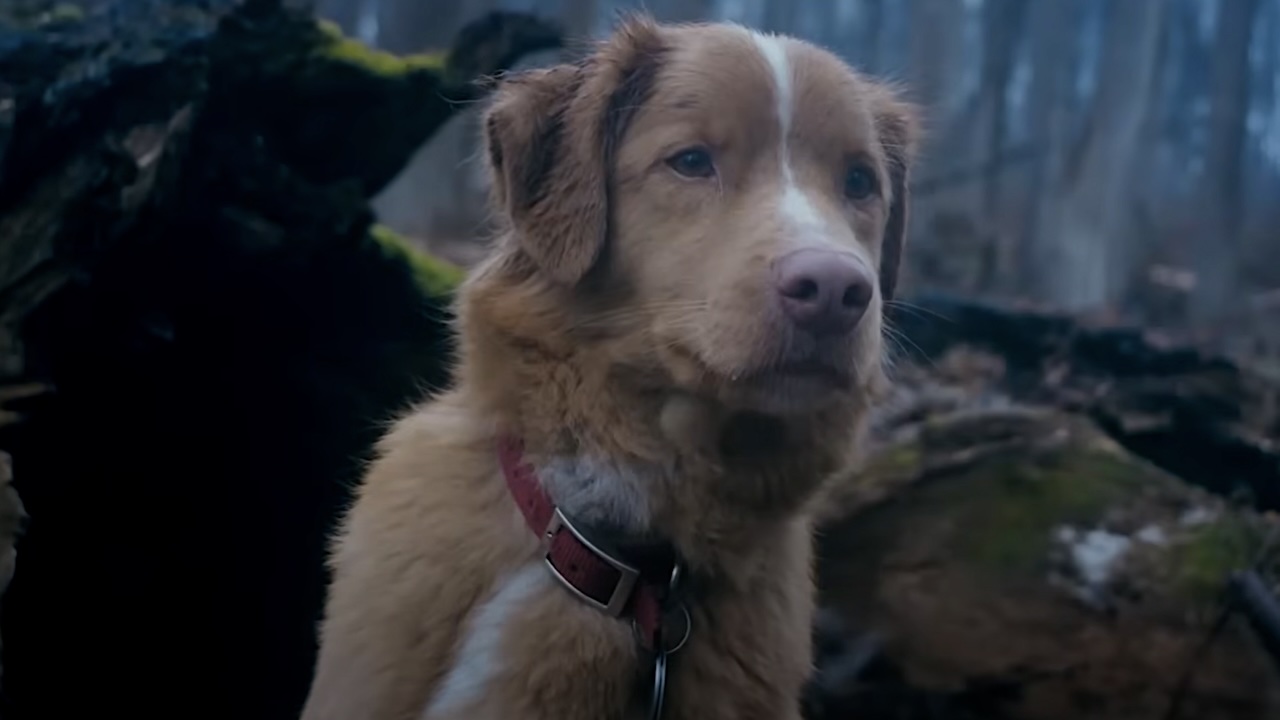The Help Set Visit: Talking Accents And Heat With Emma Stone On Location In The Deep South
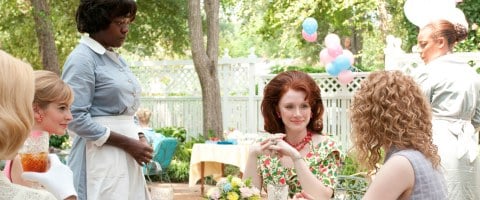
Greenwood, Mississippi is a special kind of hellishly hot in early August. Having grown up three states away in South Carolina I'm usually prepared for this, but I couldn't have imagined the wall of heat, humidity and distant cicadas that awaited me in Greenwood, a town of 15,000 about two hours north of Jackson. The heat was unavoidable and constant, threatening to drown out the pleasures of Greenwood's lush neighborhoods and the inimitably friendly people.
And unlike Emma Stone, Bryce Dallas Howard and a fleet of extras cast from a local sorority, I wasn't weighed down with heavy period clothing, shellacked hair or even a wig.
The day I visited the set of The Help, the movie adaptation of Kathryn Stockett's massively successful novel, production had set up at an old 60s ranch house in a quiet Greenwood neighborhood-- not as nice as some of the nearby mansions, but a perfect home for the character who was hosting the bridge party in the scene that day. And though it looked old from the outside, it had been refitted indoors to look brand new as it would have in 1962, when The Help is set-- right down to the leather luggage in the hall closet and the tchotchkes in the front living room. The production had pretty much taken over the neighborhood surrounding the house, from a bathroom trailer parked down the road to the massive lights set up in the yard, but local neighbors seemed more impressed than annoyed-- after all, it's not every day Hollywood comes to small-town Mississippi.
The specific dialogue we saw them shoot actually kicks off the trailer, as Stone's lead character Skeeter arrives at the bridge party hosted by Elizabeth Leefolt, one of the many old friends she left behind to attend Ole Miss. One guest hugs her and exclaims, "We never thought you'd leave Ole MIss!", a relatively innocuous comment that still inspires Skeeter to fire back, "Well, it does take four years Jolene."
Also in the chattering circle of done-up women greeting Skeeter is Hilly Holbrook (Howard), Skeeter's childhood best friend who quickly evolves into the story's villain. Hilly wants to set Skeeter up on a date, and it's clear that Skeeter's got bigger things on her mind-- Stone told us later in a quick conversation that Skeeter has just come from an interview at the Jackson Journal, and though she hasn't yet gotten the idea to write the book about African-American maids that will provide the film's drama, she's definitely not like the other girls at this bridge party. Later on in the film she'll start conducting secret interviews with local maids and nannies like Viola Davis's Aibilene and Octavia Spencer's Minny, exposing the true conditions of their working lives and throwing her own community into chaos. Hilly, it turns out, isn't the only wealthy white woman who doesn't actually want to hear what her black maids think about her.
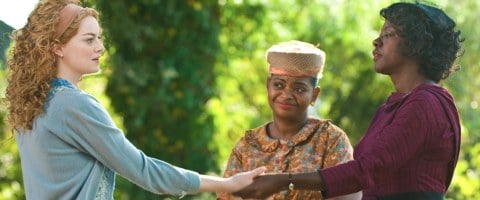
We watched all this action from the confines of an air-conditioned tent in the backyard, both because there wasn't space to set up a group of five journalists inside the house and sitting outside without air-conditioning would quickly prove miserable. Sharing the same tent were the group of extras, mostly local Mississippi girls done up in incredibly detailed period outfits, right down to the bouffant hair and elaborate jewelry. They'd tramp over to the house for a new scene, then return to the relief of air conditioning not long after, over and over again-- the repetitive but necessary magic of moviemaking.
The other journalists and I spent the entire day on the set-- there's not really anything else do in Greenwood, as Viola Davis freely admitted when she said she and her husband would visit the local Wal-Mart for entertainment. Between takes we got the chance to talk to nearly all of the film's main players, getting quick interviews with Howard and Stone before they were needed back on set and lengthy conversations with Davis and Octavia Spencer, who had come to the set that day only to talk to us. I'll be bringing you a series of those interviews over the next few days, starting with Stone and producer Chris Columbus and wrapping up with Howard and director Tate Taylor, a MIssissippi native and childhood friend of author Stockett who takes his responsibilities to The Help very, very seriously.
Your Daily Blend of Entertainment News
Later this week you can read about how Octavia Spencer came to play a character who was inspired by her, Viola Davis's personal connections to the Civil Rights era in the South, how the relatively inexperienced director Taylor landed the job, and Howard's glee in playing a genuine villain. But first we talk to Emma Stone-- looking flawless during our un-air-conditioned conversation on the patio despite heavy clothes and a wig-- and Chris Columbus, the director of films like the first two Harry Potter films and Home Alone who recognizes he's entering uncharted territory as a producer here. The Help opens Wednesday, August 10.
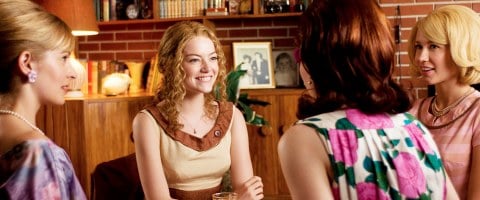
Emma Stone
It's worth remembering that when The Help filmed last summer, Stone hadn't yet been cast as Gwen Stacy in the upcoming The Amazing Spider-Man and hadn't even seen her breakthrough film Easy A released. She was still very much a rising movie star, reflected by the fact that she ate lunch at the church cafeteria alongside the rest of the crew and pretended not to even mind the heat. Of course, that all might be because she's just that cool.
I'm sure there's a good character reason for this, but you're wearing twice as much clothing as everybody else.
Well I take the jacket off in the next part of the scene.
So this is Skeeter being more conservatively dressed than everybody else?
Yeah, just a little bit. I just came from my job interview at the Jackson Journal, so I think she's trying to cover up a little bit more. But you know, Skeeter is a pretty modest girl.
We heard that you nailed it in your very first reading. What was it that you knew about the character that was so persuasive?
I didn't know that they felt that way, but it's very nice to hear. Well, Skeeter and I have a lot more in common than I would probably care to admit originally. Of course I'm not as brave as she is, in the endeavors she's taking on, but I do understand being maybe a little different than your peers in a way. But everyone's gone through that. I liked so much about her, and that she wasn't a martyr, and the lessons she learns and the way she learns it. I don't know what it was about me though. I love this girl, so I'm trying to do the best I can to accurately bring her to life.
Not being a Southerner, what's it like jumping into this and being surrounded by so many Southerners. What's the pressure there, and what are some of the more important things you've learned?
Well we're lucky enough to be shooting in the South, which is so great, and as far as the accent went we had a really fantastic dialogue coach named Nadia. We did a lot of work over Skype before I got here, and once I got here we did it in person. Being surrounded by Southerners and hearing their stories, and watching things about Civil Rights history, like Eyes on the Prize or reading books about Jim Crow, that kind of helps me with the backstory in terms of the time period. As far as being in the South, we're so lucky that we're in Mississippi. I never knew what the real feeling of being in the South was like, and the kind of secrecy, and the two sides there are to everybody. We're in a small town, and everyone's been so nice and so welcoming, but they also know everything that's going on. They know if I had someone over to my house last night. It really shows, really informs what we're talking about in the movie. The secrecy required for something this illegal at the time-- I now understand so much more how quickly word travels in a small town in the South. It's good to know what it's like.
How easy is it to get that love-hate relationship between you and Bryce's character?
Bryce, I think, has been pretty note-perfect so far. It's really important to Tate to establish that Hilly and Skeeter were best friends, and they really do love each other. And they still really love each other underneath it all, but they haven't really spent a lot of time together the last four years, and in those four very formative college years, their opinions on things greatly differ, and it becomes more apparent now that Hilly is married and has kids. It's easy for me, just because of the way that she's playing it, it's been so fantastic. She can switch from [in a thick Southern accent] sweet as pie to just awful in a heartbeat, and she's figured out the balance really well. It's kind of my job to react to whatever mood Hilly's in.
What's it like working in a cast that's mostly female? How does that change the environment and the vibe?
I think we've been pretty lucky on this one. Everyone is here to make the same movie, and no one's really come with an ego on them. When that's the case, and it's women, it's actually pretty-- I don't want to sound all girl power here, but it's been a nice kind of empowering environment to be in. Tate is just keeping a calendar of when who is going through any hormonal times, so he's aware, because he's surrounded by nine emotional actressy females.
You should be all on cycle by now.
Exactly, so it's the week from hell, and three weeks of sweet, loving, "You were so great just then!"
What's it been like working in this weather?
I've got a wig on, so that's been interesting just with the netting, and the girdle. It's hot. But I'm from Arizona, in the desert, which makes you feel like you're being cooked to death. Here, for me, I feel alive at least. There's at least moisture, and "Oh, I'm a human being, breathing air." But the mosquitoes are godawful.
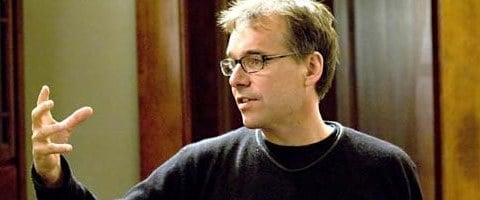
Producer Chris Columbus
You're filming in Mississippi as opposed to somewhere like Louisiana with its tax breaks. You guys are trailblazers with Mississippi film productions.
I don't know if it has anything to do wanting to be trailblazers. It really has to do with Tate's original concept and vision for the film, when he set out to do this, when he first came down here to scout locations, he was convinced that this movie was going to be shot in Greenwood. When he called me and told me that most of the locations were within 5-10 minutes of the hotel, I was skeptical. This has never happened to me in my entire career. When I came down here and saw that in a sense some of these locations are frozen in time, it felt like this guy really knew what he was doing. I was very impressed with all the locations he chose.
Since you're used to the East Coast and California, what has it been like to be here for you?
I was just kind of amazed at the excitement of the community, that this picture is being shot here, and the pride everyone has. And truly, having spent about 17 years of my life in Manhattan, the friendliness of everyone. I'm one of a few people who think New Yorkers are always there to help yo out, but these people, they invite you to their homes, they want you to have dinner with them, there really is a sense of community. And everyone knows what everyone is up to at all times, so everyone really behaves themselves.
I know you said Greenwood was frozen in time, but still you had to make some adjustments for the period.
Based on the budget of the film-- it's a modest budget-- we were fortunate in this situation that we couldn't build sets. We had to find locations that could be modified. The house we're shooting in now was probably built in 1959 or 60, but when we walked into the house it felt a little older than it needed to be. Back when this picture was being shot it felt brand spanking new. It would have had a shimmer of newness about it. Our production designer Mark was really helpful about polishing up some locations.
Aside from the fact that Tate grew up with the author Kathryn Stockett, what makes him the right guy to handle this?
I met with Tate [after watching his short film "Chicken Party"] and said, "If you have anything else you're interested in bring it our way, we like to support young directors." Tate and I kept meeting through the years. At one point he came up to San Francisco and said the thing I really want to do is this book, it hadn't come out yet, and I think it was the uncorrected proof of the manuscript and he gave it to me. I thought it was interesting, but thought "That's a woman's book." I went home and gave it to my wife, and she read it over the weekend and she said, "This is an amazing book, you guys should really think about doing it."
Tate's other films didn't show a sense of the subtlety-- he basically did two broad comedies. I was very intrigued as to what kind of screenplay he would write. And it was fantastic. that was the point where we said we want to make the movie. After seeing 5 weeks of dailies, I don't think anyone else could have directed this film, because he knows this world inside and out. It's what they used to tell me back in film school, write about something, direct something that you really know well. And he really brings authenticity to this movie.
Emma Stone isn't who you'd immediately think of for Skeeter-- she's not from the South, she doesn't have that crazy hair. But you guys seem to have a lot of faith in her.
She's an amazing actress. Again, Skeeter is supposed to be tall, and have horrible hair-- but she's a direct contrast, she's very naturalistic and very real with these very sprayed beehives. Emma brings a real sense of reality to that character. She feels more authentic, and I think you see Emma in a way you've never seen her before. She kind of disappears into the role.
Is the movie only aimed toward women audiences?
I think women will bring their husbands and boyfriends to the movie. I think the movie does not feel as soft. It's not too sweet, too soft-- it's very edgy and kind of dark at times. Tate fills it at times with a little twisted Southern humor here and there. My reaction to the book before it was published was, will it be one of those chick lit things? And it's not, it's pretty hard edged.
You came into the project before it was a huge bestseller. How does that change the chemistry of your negotiations with the studio, to go in with an unknown project vs. a known property.
Remember, when we first handed in the script, it was not the phenomenon that it has become. So a lot of people said no. Eventually, thanks to DreamWorks and Disney, they stepped up to the plate and decided to make the movie with a relatively first-time director. This is the first time Tate has been involved in a big studio movie. I think it took a lot of guts from those guys to do that. I knew it was pretty special when I was in Mexico and I was walking along the beach, and every woman was reading the book.
Did they ever try and convince you to direct?
I think one person asked, and I was committed to my relationship with Tate. I had to support him. I told him from day one that there's no way that's ever going to happen. There's also a great security for him. I still think I'm going to get fired on every job I'm doing.
What advice did you give him about directing?
I didn't have to give him much advice. A lot of that stuff I consider extremely personal. He is an incredibly, incredibly fast learner. I defy anyone to walk on the set and think this guys hasn't directed 5 or 6 movies. He has a tremendous amount of confidence, and he's given us dailies that not only have we fallen in love with, but DreamWorks and Steven Spielberg and everyone who sees them loves them. I really think he is a very quick study. That probably comes from being an actor.
What's been the biggest surprise so far in this process?
One of the things I've always wanted to do is be involved a movie where you start to feel real emotion, if it's hatred or anger toward what would be perceived as the villain of the piece. It's taken 7 Harry Potter movies to start feeling that hatred toward Voldemort, but in this movie Bryce Dallas Howard, who is one of the sweetest nicest people I've ever met, turns in a performance that's reminiscent to me of Louise Fletcher in One Flew Over The Cuckoo's Nest. She kills you with kindness. I'm watching the monitor, and I want to kill her. The audience is going to relish this performance. That's a big surprise, how much anger I have toward that character. It's great.
As a Southerner, what kind of nuances has Tate picked up on as a director that you wouldn't have?
Things like accent, things like food. The food they served [at fancy parties in the 60s] is horrendous, but it's real. It's the wardrobe; when I saw some of the wardrobe I said "People wear this kind of stuff?" and Tate told me about Ole Miss games, where they put up tents with chandeliers, and it's 90 degrees and women wear fur coats. In terms of directing, you've got the right guy.
Staff Writer at CinemaBlend

